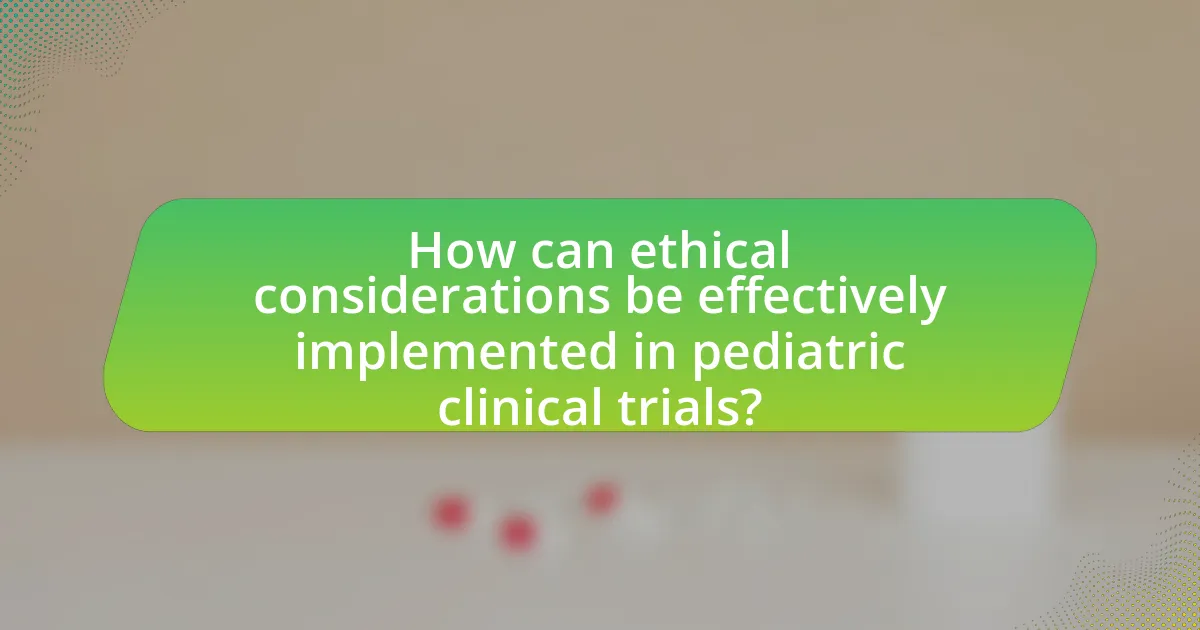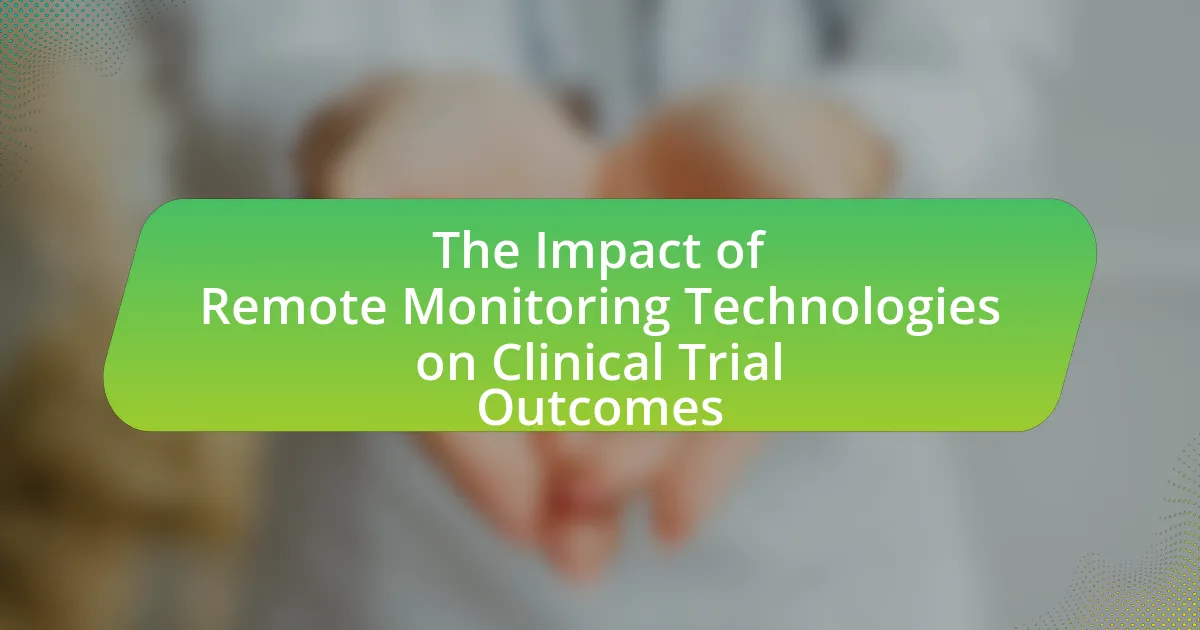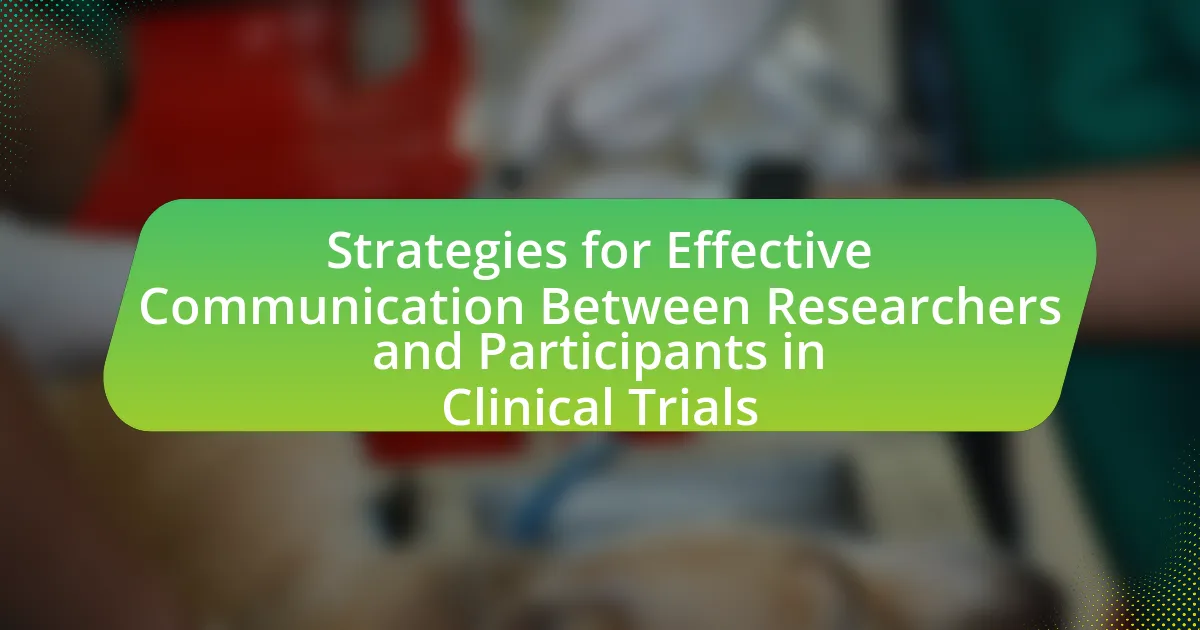The article focuses on ethical considerations in pediatric clinical trials, emphasizing the protection of vulnerable child populations, the necessity of informed consent from parents or guardians, and the careful evaluation of the risk-benefit ratio. It outlines the unique challenges children present in clinical research, including their developmental stage and varying levels of understanding. The article also discusses the regulatory frameworks and ethical guidelines that govern pediatric research, the role of Institutional Review Boards (IRBs) in ensuring ethical compliance, and the importance of engaging families in the consent process. Additionally, it highlights the potential risks and benefits for child participants, as well as best practices for researchers to uphold ethical standards throughout clinical trials.

What are the Ethical Considerations in Pediatric Clinical Trials?
Ethical considerations in pediatric clinical trials primarily revolve around the protection of vulnerable populations, informed consent, and the risk-benefit ratio. Children are considered a vulnerable group due to their limited ability to understand complex medical information and make autonomous decisions. Therefore, obtaining informed consent from parents or guardians, along with assent from the child when appropriate, is crucial to ensure ethical participation. Additionally, the risk-benefit ratio must be carefully evaluated; the potential benefits of the research must outweigh the risks involved, as mandated by ethical guidelines such as the Declaration of Helsinki and the Belmont Report. These guidelines emphasize the necessity of minimizing risks and ensuring that the research is conducted with the utmost respect for the rights and welfare of child participants.
Why are ethical considerations crucial in pediatric clinical trials?
Ethical considerations are crucial in pediatric clinical trials because children are a vulnerable population that requires special protections. The necessity for informed consent is heightened, as minors cannot provide legal consent themselves; thus, parental or guardian consent is essential to ensure that the child’s best interests are prioritized. Additionally, ethical guidelines, such as those outlined in the Declaration of Helsinki, emphasize the importance of minimizing risks and ensuring that the potential benefits of research outweigh any harm. This is particularly important in pediatrics, where the long-term effects of interventions may not be fully understood. Furthermore, ethical oversight by institutional review boards ensures that trials adhere to established ethical standards, safeguarding the welfare of child participants.
What unique challenges do children present in clinical research?
Children present unique challenges in clinical research primarily due to their developmental stage, which affects their ability to provide informed consent and understand the implications of participation. Their cognitive and emotional maturity varies widely, making it difficult to assess their comprehension of study protocols. Additionally, ethical considerations arise regarding the risk-benefit ratio, as children are more vulnerable to potential adverse effects and may not fully grasp the consequences of participation. Regulatory frameworks, such as the Common Rule in the United States, impose stricter guidelines for research involving minors, necessitating parental consent and assent from the child, which complicates recruitment and retention efforts. Furthermore, the need for age-appropriate methodologies and the potential for long-term impacts on development add layers of complexity to designing and conducting pediatric trials.
How do ethical principles apply specifically to pediatric populations?
Ethical principles in pediatric populations emphasize the need for protection, respect, and justice due to their vulnerability and developmental stage. Informed consent must involve parents or guardians, while assent from the child is also encouraged to respect their autonomy. The principle of beneficence requires that any intervention must provide a favorable risk-benefit ratio, ensuring that potential benefits outweigh risks. Additionally, justice mandates equitable access to research opportunities, preventing exploitation of disadvantaged groups. These principles are supported by guidelines such as the Declaration of Helsinki and the Belmont Report, which specifically address the ethical treatment of children in research contexts.
What regulations govern ethical practices in pediatric clinical trials?
The regulations that govern ethical practices in pediatric clinical trials include the Common Rule, the Food and Drug Administration (FDA) regulations, and the International Conference on Harmonisation (ICH) guidelines. The Common Rule, codified in 45 CFR 46, outlines the requirements for informed consent and the protection of vulnerable populations, including children. The FDA regulations, specifically 21 CFR 50 and 21 CFR 56, provide additional protections and stipulate that research involving children must ensure that risks are minimized and justified by potential benefits. The ICH guidelines, particularly E6(R2), emphasize the importance of ethical considerations in clinical trials, including the necessity of obtaining assent from children when appropriate. These regulations collectively ensure that pediatric clinical trials are conducted ethically, prioritizing the safety and rights of child participants.
Which organizations set the ethical guidelines for pediatric research?
The organizations that set the ethical guidelines for pediatric research include the American Academy of Pediatrics (AAP), the World Health Organization (WHO), and the National Institutes of Health (NIH). The AAP provides specific recommendations for ethical practices in pediatric research, emphasizing the need for informed consent and the protection of vulnerable populations. The WHO outlines ethical standards for research involving children, focusing on their rights and welfare. The NIH also establishes guidelines that ensure ethical considerations are prioritized in studies involving pediatric subjects, particularly in terms of risk assessment and benefit analysis. These organizations collectively contribute to a framework that safeguards the ethical conduct of research involving children.
What role do Institutional Review Boards (IRBs) play in these trials?
Institutional Review Boards (IRBs) are responsible for ensuring the ethical conduct of clinical trials, particularly in protecting the rights and welfare of participants. They review research protocols to assess risks, benefits, and the informed consent process, ensuring that the trials comply with ethical standards and regulatory requirements. For instance, IRBs evaluate whether the potential benefits of the research outweigh the risks to pediatric participants, who may be more vulnerable than adult populations. This oversight is crucial in maintaining ethical integrity and safeguarding the interests of children involved in clinical research.
How is informed consent obtained in pediatric clinical trials?
Informed consent in pediatric clinical trials is obtained through a process that involves both the parents or legal guardians and, when appropriate, the child participants themselves. The process typically includes providing comprehensive information about the study’s purpose, procedures, risks, and benefits in a manner that is understandable to the guardians and age-appropriate for the child.
The U.S. Department of Health and Human Services mandates that for children, assent must be obtained from the child when they are capable of understanding the information, while consent is obtained from the parents or guardians. This dual approach ensures that both the legal and ethical rights of the child are respected, aligning with the principles outlined in the Belmont Report, which emphasizes respect for persons, beneficence, and justice in research involving human subjects.
What is the process for obtaining consent from parents or guardians?
The process for obtaining consent from parents or guardians involves providing them with comprehensive information about the clinical trial, including its purpose, procedures, risks, and benefits. This information must be presented in a clear and understandable manner, allowing parents or guardians to make an informed decision regarding their child’s participation.
Following the information session, parents or guardians must be given the opportunity to ask questions and discuss any concerns they may have. Once they feel adequately informed, they can provide written consent, which is a legal requirement in pediatric clinical trials. This process ensures that ethical standards are upheld, as mandated by regulations such as the U.S. Department of Health and Human Services’ Common Rule, which emphasizes the necessity of informed consent in research involving minors.
How is assent from children incorporated into the consent process?
Assent from children is incorporated into the consent process by obtaining their agreement to participate in research, in addition to parental or guardian consent. This process acknowledges the developing autonomy of children and ensures that they understand the nature of the study, its risks, and benefits in an age-appropriate manner. Ethical guidelines, such as those from the American Academy of Pediatrics, emphasize that children should be given the opportunity to express their willingness to participate, which fosters respect for their emerging rights and decision-making capabilities.

What are the potential risks and benefits of pediatric clinical trials?
Pediatric clinical trials present both potential risks and benefits. The benefits include access to new treatments that may improve health outcomes for children, as well as the advancement of medical knowledge specific to pediatric populations, which is often underrepresented in research. For instance, a study published in the Journal of the American Medical Association found that pediatric clinical trials can lead to significant improvements in treatment protocols for childhood diseases, enhancing overall care.
Conversely, the risks involve the possibility of adverse effects from experimental treatments, which may be more pronounced in children due to their developing bodies and differing metabolism compared to adults. Ethical concerns also arise regarding informed consent, as children may not fully understand the implications of participation. Research indicates that careful ethical oversight is essential to mitigate these risks while maximizing the benefits, ensuring that trials are conducted with the utmost consideration for the safety and well-being of child participants.
What risks do children face when participating in clinical trials?
Children face several risks when participating in clinical trials, including potential adverse effects from experimental treatments, psychological stress, and the possibility of receiving a placebo instead of active treatment. Adverse effects can range from mild to severe, as children may react differently to medications than adults, leading to unexpected health complications. Psychological stress can arise from the clinical trial environment, including frequent medical assessments and the uncertainty of outcomes. Additionally, the use of placebos can delay access to effective treatments, which may be particularly concerning for children with serious health conditions. These risks highlight the importance of ethical considerations in pediatric clinical trials, ensuring that the potential benefits outweigh the risks for child participants.
How are risks assessed and minimized in pediatric studies?
Risks in pediatric studies are assessed and minimized through a combination of ethical guidelines, regulatory frameworks, and specific methodologies tailored to children. Institutional Review Boards (IRBs) evaluate the potential risks versus benefits of the study, ensuring that the research design prioritizes child safety. Additionally, informed consent is obtained from parents or guardians, while assent is sought from the children when appropriate, ensuring that participants understand the study’s nature and risks.
Furthermore, researchers implement risk mitigation strategies such as using age-appropriate protocols, continuous monitoring of participants, and adapting study designs based on interim findings. The U.S. Department of Health and Human Services outlines specific regulations (45 CFR 46 Subpart D) that protect children in research, emphasizing the need for minimal risk and the necessity of direct benefits to the child or knowledge that could benefit children in general. These measures collectively ensure that risks are systematically assessed and minimized in pediatric studies.
What are the long-term implications of these risks for child participants?
The long-term implications of risks for child participants in pediatric clinical trials include potential physical, psychological, and developmental harm. Children exposed to risks such as adverse drug reactions may experience chronic health issues, which can affect their quality of life and future health outcomes. Psychological impacts, including anxiety and trust issues related to medical interventions, can hinder their willingness to seek care in the future. Developmentally, children may face delays or impairments if the trial involves interventions that affect their growth or cognitive functions. Research indicates that children who experience negative outcomes in clinical trials may have lasting effects on their mental health and social relationships, as highlighted in studies examining the long-term follow-up of pediatric trial participants.
What benefits can pediatric clinical trials provide to participants?
Pediatric clinical trials provide participants with access to new treatments and therapies that may not yet be available to the general population. These trials often offer cutting-edge medical interventions that can lead to improved health outcomes for children with specific conditions. Additionally, participants may receive enhanced medical care and monitoring throughout the trial, which can lead to better management of their health issues. Research indicates that children involved in clinical trials often experience a higher level of medical attention, as they are closely monitored by healthcare professionals. Furthermore, participation contributes to medical knowledge that can benefit future pediatric patients, as findings from these trials can lead to advancements in treatment protocols and improved healthcare practices for children.
How do clinical trials contribute to advancements in pediatric medicine?
Clinical trials significantly contribute to advancements in pediatric medicine by providing evidence-based data that informs treatment protocols and medication dosages specifically tailored for children. These trials enable researchers to evaluate the safety and efficacy of new therapies in pediatric populations, which differ physiologically and metabolically from adults. For instance, a study published in the Journal of the American Medical Association found that pediatric clinical trials led to the approval of 30 new drugs for children between 2010 and 2019, demonstrating a direct impact on therapeutic options available for pediatric patients. By focusing on the unique needs of children, clinical trials ensure that medical advancements are both safe and effective for younger populations, ultimately improving health outcomes.
What are the potential health benefits for children involved in trials?
Children involved in clinical trials may experience several potential health benefits, including access to new treatments, enhanced medical care, and close monitoring by healthcare professionals. Participation in trials often provides children with early access to innovative therapies that may not yet be available to the general public, potentially leading to improved health outcomes. Additionally, the rigorous oversight and frequent assessments associated with clinical trials can result in better management of existing health conditions. Research indicates that children enrolled in trials may receive more comprehensive care, which can contribute to their overall well-being and health improvements.

How can ethical considerations be effectively implemented in pediatric clinical trials?
Ethical considerations can be effectively implemented in pediatric clinical trials by ensuring informed consent is obtained from parents or guardians, while also considering the assent of the child when appropriate. This approach aligns with the ethical principle of respect for persons, which emphasizes the need for voluntary participation and understanding of the trial’s nature and risks. Additionally, the trials must adhere to the principles of beneficence and non-maleficence, ensuring that the potential benefits outweigh the risks for child participants. Regulatory frameworks, such as the Declaration of Helsinki and the U.S. Common Rule, provide guidelines that mandate ethical oversight and review by Institutional Review Boards (IRBs) to safeguard the welfare of pediatric subjects. These measures collectively ensure that ethical standards are upheld throughout the research process.
What best practices should researchers follow to ensure ethical compliance?
Researchers should obtain informed consent from participants or their guardians to ensure ethical compliance in pediatric clinical trials. This practice involves clearly explaining the study’s purpose, procedures, risks, and benefits to ensure that participants understand what they are agreeing to. Additionally, researchers must adhere to ethical guidelines established by organizations such as the Declaration of Helsinki, which emphasizes the importance of protecting vulnerable populations, including children. Furthermore, researchers should undergo institutional review board (IRB) approval to ensure that their study design meets ethical standards and that risks are minimized. These practices are essential for maintaining trust and integrity in research involving children, as highlighted by the American Academy of Pediatrics, which stresses the necessity of ethical oversight in pediatric research.
How can researchers engage with families to enhance ethical practices?
Researchers can engage with families to enhance ethical practices by implementing transparent communication strategies and involving them in the research process. This approach fosters trust and ensures that families understand the implications of participation, as evidenced by studies showing that informed consent processes that include family discussions lead to higher satisfaction and ethical compliance. For instance, the research conducted by McLaughlin et al. (2020) in the Journal of Medical Ethics highlights that when families are actively involved in decision-making, it results in better adherence to ethical standards and improved outcomes in pediatric clinical trials.
What training is necessary for researchers conducting pediatric trials?
Researchers conducting pediatric trials must undergo specialized training in pediatric ethics, regulatory requirements, and child development. This training ensures that researchers understand the unique vulnerabilities of children as research subjects and the ethical implications of obtaining informed consent from guardians. Additionally, training often includes knowledge of the legal frameworks governing pediatric research, such as the Common Rule and the FDA regulations, which mandate specific protections for minors. Evidence from the National Institutes of Health emphasizes the importance of this training to safeguard the welfare of child participants and to ensure compliance with ethical standards in clinical research.
What are common challenges in maintaining ethical standards in pediatric trials?
Common challenges in maintaining ethical standards in pediatric trials include obtaining informed consent, ensuring the child’s understanding, and balancing risk versus benefit. Informed consent is complicated by the need for parental permission while also considering the child’s assent, which requires clear communication tailored to their developmental level. Additionally, pediatric trials often involve vulnerable populations, making it crucial to minimize risks and ensure that the potential benefits justify any risks involved. Research indicates that ethical dilemmas frequently arise when assessing the appropriateness of interventions for children, as seen in studies highlighting the difficulties in aligning trial protocols with ethical guidelines (e.g., the Declaration of Helsinki).
How can conflicts of interest be managed in pediatric research?
Conflicts of interest in pediatric research can be managed through transparency, rigorous oversight, and adherence to ethical guidelines. Researchers should disclose any financial or personal interests that may influence their work, ensuring that all stakeholders are aware of potential biases. Institutional Review Boards (IRBs) play a crucial role by reviewing research proposals to identify and mitigate conflicts before studies commence. Additionally, implementing policies that require independent monitoring of research can help maintain objectivity. Evidence from the American Academy of Pediatrics emphasizes the importance of these practices in safeguarding the integrity of pediatric research and protecting vulnerable populations.
What strategies can be employed to address ethical dilemmas in trials?
To address ethical dilemmas in trials, particularly in pediatric clinical trials, researchers can employ strategies such as obtaining informed consent, ensuring the involvement of ethics committees, and implementing robust risk-benefit assessments. Informed consent is crucial as it ensures that guardians understand the trial’s purpose, procedures, and potential risks, thereby respecting the autonomy of both the child and the guardian. The involvement of ethics committees provides an additional layer of oversight, ensuring that the trial adheres to ethical standards and protects participants’ rights. Furthermore, conducting thorough risk-benefit assessments helps to evaluate whether the potential benefits of the trial justify the risks involved, which is essential in pediatric populations where vulnerability is heightened. These strategies are supported by guidelines from organizations such as the World Health Organization and the Declaration of Helsinki, which emphasize the importance of ethical considerations in research involving children.
What practical tips can enhance ethical practices in pediatric clinical trials?
To enhance ethical practices in pediatric clinical trials, researchers should prioritize informed consent by ensuring that both parents and children understand the study’s purpose, risks, and benefits. This can be achieved through age-appropriate educational materials and discussions that facilitate comprehension. Additionally, implementing a robust oversight mechanism, such as an independent ethics committee, can help ensure that the trials adhere to ethical standards and protect the welfare of child participants. Research indicates that trials with strong ethical oversight are more likely to maintain participant trust and safety, as highlighted in the “Guidelines for Ethical Research in Children” published by the American Academy of Pediatrics.






